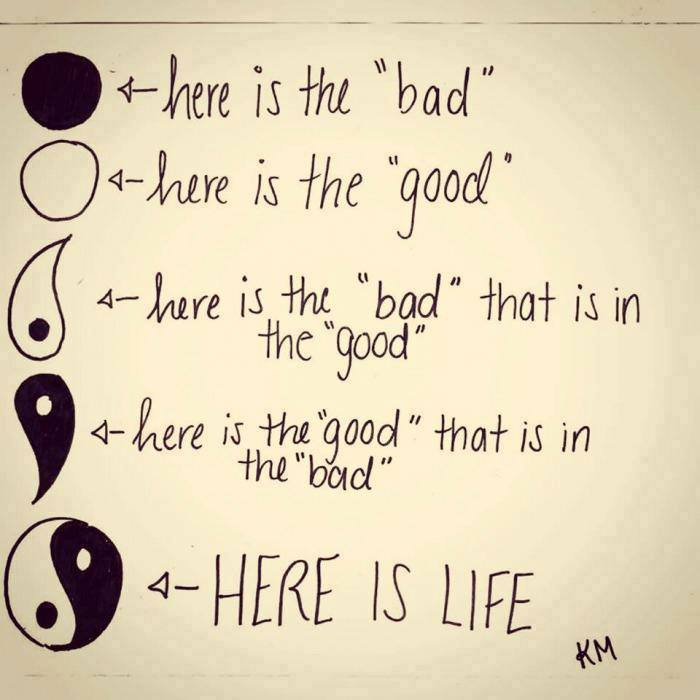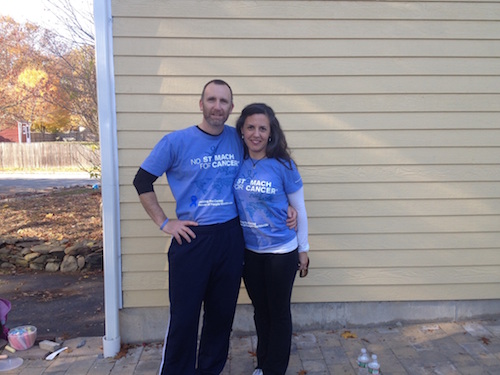
As I sit to write this, I realize my story is like a double-sided coin. On one side, I am an extremely lucky person. On the other side, I’m a cancer patient and survivor. It has taken a lot of effort and emotion for me to come to terms with that statement…that label – cancer patient. But there really is no disputing it. As a matter of fact, I am a two-time cancer survivor! Here’s my story.
Two years after learning that I carry the CDH1 genetic mutation, which put me at a very high risk of developing a hard to detect, and even harder to treat, form of gastric cancer (HDGC), I decided to do what the doctors recommended and have my stomach removed as a preventative measure. This surgery is called a prophylactic total gastrectomy (PTG) and I had it done in July 2011 when I was 40 years old. I went from having up to an 80% chance of developing HDGC, down to less than a 1% chance. The interesting thing was that when they ran the pathology on my stomach tissue after removing it, they found four small areas of previously undetected early invasive carcinoma. So, I actually had cancer and didn’t even know it! But, the good news was that because it was localized, and had not spread to any lymph nodes, I was considered cured with no further treatment needed. Adjusting to life without a stomach was a challenge, but things improved over time, and I was certainly motivated by enough gratitude to get me through that process. At that point, I never really considered myself a cancer survivor. But, my story doesn’t end there.

Ever since I first learned I carry the CDH1 mutation in 2009, I had another little thing to deal with… an increased risk of breast cancer. With the CDH1 mutation, in addition to the high risk of stomach cancer, the risk for developing lobular breast cancer is 40-60% over the course of a lifetime. So for the past five years, every six months I alternated between having a mammogram and a breast MRI to screen for potential abnormal areas. These screenings were regular reminders of my potential risk, but I also always felt fairly hopeful that if they should ever find something it would be early enough to be treated successfully. The truth of the matter is that breast cancer research is much more advanced compared to stomach cancer. And, since I was being treated at one of the major centers of excellence in the world for my screenings (Massachusetts General Hospital in Boston), I was in very good hands. I didn’t feel the need to dwell on it too much.
That is, until late March of this year (2014). Following my most recent breast MRI, I received a call saying that they think they saw an abnormal spot and wanted to investigate it further. Within a few days, I had a biopsy and had the results. It was indeed a very small spot of invasive lobular carcinoma of the breast. Even though this is something I always knew was a possibility, nothing could prepare me for the reality of hearing this news and then having to actually tell the people that I love, “I have breast cancer.” Doing so was extremely difficult and emotional given my family’s history with the disease. We’ve each witnessed the struggles of other family members who have passed on, and we tried not to let the fear overtake us and fought hard to be as positive as possible.
So again, on one side of the coin, I had breast cancer. But on the other side, this was part of the potential plan all along – detect it early, take care of it aggressively, and hopefully get on with my life. Since it was found very early, I was truly fortunate. If I were not getting regular screenings, this would have not been found until it was much further along. Even if I were getting just an annual mammogram, it may not have been found. I believe it was the sensitivity of the MRI along with the contrast dye they inject in the process which proved to be most effective.
True to my word, and also at the recommendation of my doctors, I agreed to have a double mastectomy with reconstruction on April 30, 2014. Even though the cancer was only found in one breast and was a very tiny area, the likelihood of it developing further, and also in the other breast eventually, was pretty high. The choice then became, have one operation now, or have one now and very likely having another one sometime in the future. That was an easy decision.
I had three weeks before the surgery to emotionally come to terms with my diagnosis. What scared me wasn’t the surgery itself, but the unknown factor that there could be more cancer found. My doctors wouldn’t give me any indication if I would need further treatment such as chemotherapy or radiation, until after the surgery and pathology tests were performed. As you can imagine, this made me pretty nervous.
The surgery itself went smoothly with no complications. While in the operating room, they conducted a preliminary test on the lymph node on the side that the cancer was found, and it was clear with no sign of cancer. This tells the surgeon that the cancer did not spread beyond the breast tissue, and there was no need to remove any more lymph nodes. This was very good news. Had the cancer spread beyond the lymph nodes, this would mean it most likely would develop in another area of my body. Also, the plastic surgeon who worked in conjunction with the breast surgeon was able to fit implants in at the same time, which isn’t always possible. Many women either are not able to get implants at all for various reasons, choose not to have implants, or have to wait months after the first cancer surgery for tissue expanders to stretch the skin before having another surgery to have the implants placed. I was very fortunate.
I was in the hospital for two nights. The pain, swelling, discomfort, and soreness I felt were substantial, but bearable with the help of pain meds. I was surprised at the limited mobility in my arms. I could barely lift them, and really couldn’t move my left arm at all for several days. Over the next six weeks while I recovered at home, my mobility increased and my soreness decreased in tiny little increments. The first few weeks of recovery were filled with many emotions over the loss of my breasts and frustration over my slow progress. It seemed like I would never feel normal again, but eventually I did. Although, my doctors tell me there will always be a certain amount of numbness and tightness in that area of my body. It’s just something you become accustomed to.
About a week after surgery, I received the results of my pathology. The area of invasive lobular cancer was so small, that it had actually been removed during the biopsy! It was less than 0.75 millimeters. What was left behind was lobular carcinoma in situ (LCIS). These are abnormal cells formed in the lobules of the breast. LCIS isn’t cancer. But being diagnosed with LCIS indicates that you have an increased risk of developing breast cancer. These were found surrounding the original invasive cancer site, and were also found in other areas of both breasts. It really was just a matter of time before these cells would develop into an invasive cancer, especially with my genetic predisposition. So my decision to have a double mastectomy was justified. My risk went from 40-60% down to about 5% (less than the average woman). And on top of that, I will not need any chemo or radiation therapy!!!
There is no question that there was an enormous sense of relief and gratitude upon hearing that news. But mixed in with that was an emotion I didn’t anticipate, and something I will probably always have to try and come to terms with…I felt truly humbled. In a sense, I felt sort-of unworthy, but not because I don’t think I deserve good news. It had more to do with the fact that I understand the immense magnitude of the bullet I had just dodged. Fighting a cancer diagnosis – going through chemo, radiation, and all the side effects that correspond to those treatments – is an absolutely horrible experience that I’ve witnessed too many people endure. To know, that I’ve side-stepped this fate not once, but twice, is incredible. The pioneering research in genetics in recent years has enabled me to be fortunate enough to have a heads-up and react early. As you can imagine, this experience has drastically altered my view of life. You can also image how motivated I am to support further research so that future generations have even better stories to tell, or maybe even none at all.
As I move on from this experience, I’m not waiting on the sidelines to see which side the next coin will fall on. It doesn’t really matter to me because I know that whichever direction life takes, I will face it head-on, embracing as much joy and love from the good times as possible, as well as learning from, and striving to find the positive from the bad times. I look forward to continuing working with NSFC to increase awareness, raise funds for research, and support other families affected not only by the CDH1 genetic mutation, but all types of gastric cancers, which are in desperate need of more research. And I will work hard to stay healthy, love and cherish the people in my life, and accept whatever comes my way on this double-sided coin of life.
About Gretchen Borzi
Gretchen Borzi happily serves on the NSFC Board of Directors, and lives and works in Massachusetts with her husband and two children. She underwent a successful prophylactic total gastrectomy in 2011.